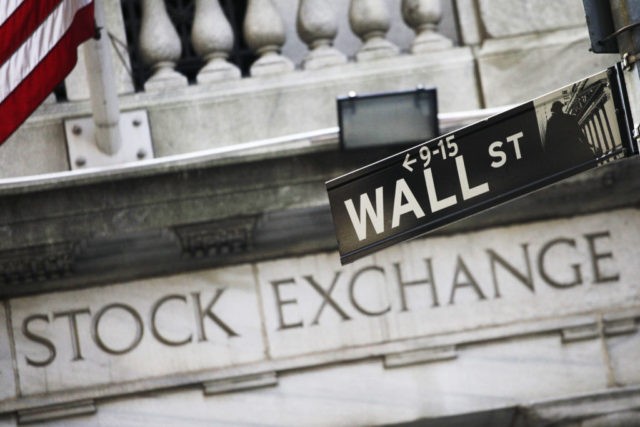“U.S. stocks opened higher on Monday, with the Dow Jones Industrial average hitting a record high, as Donald Trump’s unexpected victory in the U.S. presidential election continued to lift the market,” Reuters reported on Monday morning. The Dow opened at 18,914.78.
Fox Business saw it as the capper on the Dow’s “best week since 2011,” and found investors optimistic that Trump would fulfill “campaign promises to simplify regulation in the health and financial sectors and boost spending on infrastructure.”
By Monday afternoon, the forces of market gravity began to reassert themselves. Fox Business pointed out that tech giants Apple, Facebook, and Microsoft – none of them widely viewed as cars on the Trump Train – were holding the Nasdaq down, while “stock markets around the world were affected by a continued selloff in the global bond market as investors looked for more clarity regarding Trump’s policies.”
The bond market was portrayed as nervous about a potential Trump “spending binge.”
“The prospect of higher inflation due to higher fiscal spending under the Trump administration has caused bonds to sell off and while higher inflation is good for the U.S. economy in the long run, it is seen as a negative factor in the short term because this market is used to near zero interest rates,” explained Peter Cardillo, chief market economist for First Standard Financial.
Reuters weighed in on Monday afternoon and claimed that Nasdaq tech stocks were “under pressure as investors pour more money in other sectors that are seen benefiting from Trump’s policies.”
Also, investors unexpectedly (to the media) buoyant by Trump’s unexpected (to the media) victory are supposedly growing nervous because Trump hasn’t provided enough specific details about his economic plans, and because they’re worried he might not keep his election promises.
Apparently they expected him to put a 500-point economic plan on the table Sunday afternoon, and have never before considered the possibility that an elected politician might fail to keep all of his campaign promises. Also, one can only wonder what sort of “spending binge” financial media expected if Hillary Clinton had won the election.
A much more erudite analysis of the “Trump rally” was offered by Sven Henrich, founder of NorthmanTrader, to CNBC. In essence, he thinks some of the post-election rally was a “bounce” back from the market testing some dangerous lows right before the election, and the rally is unlikely to last because the tech titans are still pulling the market down.
(CNBC adds, without attribution, that there is “growing speculation that President-elect Trump’s policies could hurt technology companies.”)
MarketWatch reported on the Trump rally “losing steam” Monday afternoon, but threw in optimistic projections from a few analysts:
“There are a lot of people who are waiting to see the actualities of his proposals, because right now we only have the broad-brush outlines,” said Mark Grant, chief fixed income strategist at Hilltop Securities, who added that he nonetheless expected the new administration’s policies to help stock prices. “I’m very bullish about the equity market right now,” he said.
[Allianz Global Investors investment strategist Kristina] Hooper was likewise upbeat on the market.
“We would expect a somewhat upward bias to stocks in the near term. While valuations are stretched, there is significant positive sentiment to propel equities,” she said.
Over at CNN Money, on the other hand, dark speculations were floated that investors had become “too complacent” after just three business days of the Trump rally. (CNN Money was still in shock over the election, having become convinced the market really, really wanted Hillary Clinton to be President, and should have collapsed when she lost, instead of surging.)
CNN Money speculates that fiscal doom could descend because Trump is using Twitter again (supposedly reminding investors of his volatility), because tech companies don’t want to lose the foreign labor they’ve been importing through the H1-B visa program, because Trump and Amazon CEO Jeff Bezos don’t get along, because congressional Republicans may not be fully on board with Trump’s agenda… and, as with every other piece written Monday about the Trump rally fading, because the President-Elect hasn’t publicized enough details about his economic agenda.
Strategist Tom DeMark told MarketWatch he expected the Trump rally to end with a peak and tumble, with values dropping by at least 11 percent.
Appearing on Breitbart News Daily Monday morning, economist Peter Morici of the University of Maryland was unsurprised by the post-election market rally, and predicted investors would remain bullish on Trump until and unless he gives them a firm reason not to be:
The thing is, we had a ‘Trump scare’ about two weeks before the election. People started to realize he could win, and the stocks went down. But you know, after a certain point, you step back and say, ‘What would happen if we had a Trump presidency?’
You know, we’re not going to have as big a tax cut as he campaigned on, but we’re gonna have a tax cut. We’re not gonna ship back 11 million people, because we can’t, physically. But we are going to have better border control, and likely an immigration policy that focuses on the needs of the economy, and the ability of people to assimilate.
Beat Wittman of Porta Advisors took more of a wait-and-see attitude during an interview with CNBC, and suggested market performance during Trump’s first months, and maybe first years, in office could be shaped by forces set in motion long before he came on the scene.
“After 30 years of lower inflation and interest rates, we are going to head for reflation. That will be a bumpy road and we’ll see in the next few days and weeks how this U.S. administration is going to tie up on stimulating domestic demand and running foreign relationships,” said Wittmann.

COMMENTS
Please let us know if you're having issues with commenting.